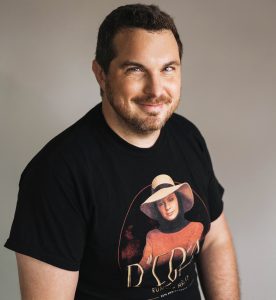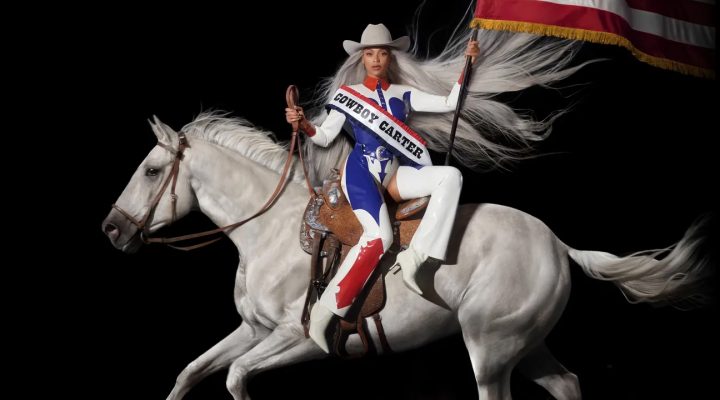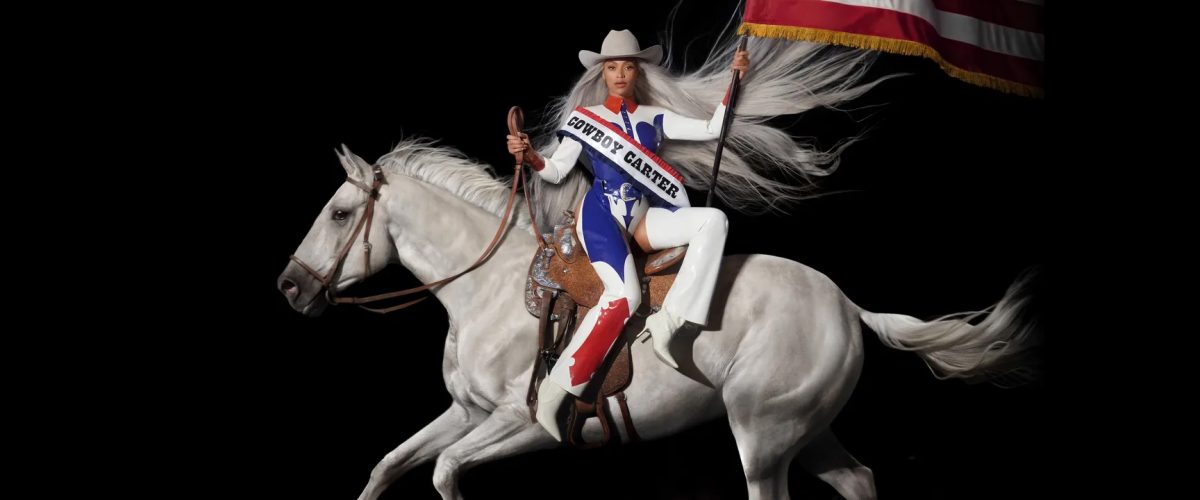With Beyoncé’s Cowboy Carter well into its second week at the top of the Billboard charts, the internet is rife with as many hot takes and opinions as 4×4 pickups at a Jason Aldean show.
Absorbing the litany of influences, references and storylines on the 27-track Cowboy Carter takes more than a couple spins around the turntable.
The album is a lot to process. “But so is being Black in America,” said singer-songwriter Crys Matthews, who writes social-justice folk music that reflects her lived experience as a queer Black woman from the South.

Crys Matthews
Cowboy Carter has been called “overstuffed,” “botched” and “weird” but according to Matthews, the album is best described as “a love letter to Black America.” It’s a perspective that relegates many reviewers and a whole lot of armchair commenters to the role of interlopers.
“It is a conversation from Beyonce to a very specific segment of her audience,” Matthews said, with “other bits of it that are kind of like the call in for everybody else.”
Like a lipstick kiss on a scented envelope, the insider dialogue in Cowboy Carter begins as public-facing imagery. The album’s red-white-and-blue, America-forward cover art prompted Washington Post pop music critic Chris Richards to suggest Beyonce traded her BLM-era activism on an album he compared to “a GOP campaign event.”
“Anytime anybody tries to discredit the patriotism of Black Americans, it’s almost a dog whistle in and of itself,” Matthews said. “Folks always forget that people who look like me fought and died for this country.”
Taylor Crumpton, a music, pop culture and politics writer from Dallas, says reactions to the release of the cover art resulted in “one of the worst the days” she’s had during her 15 years on Twitter. The relationship between Black people and the American flag is “contentious,” Crumpton said. It is a difficult time for a Black person to hold a flag when so much in the political climate is “affecting people that look like us.”
Yet, Beyoncé’s cover image can be a “two in one,” Crumpton said. She can hold a flag “out of remembrance in history while also thinking about how harmful it is current day.”
The motivation for many Black people to enlist in the military was “to be seen as an American,” Crumpton said.

Taylor Crumpton
The tension where Beyoncé sits is the same tightrope most African Americans navigate: Being perceived as “not American” by certain segments of society while also living alongside parents, grandparents and other Black veterans who served in the armed forces, said Crumpton, whose grandfather was a veteran.
The first person of African descent arrived in Texas in 1528. Yet, Crumpton observes, Black people still remain in what she calls a “citizenless state.”
Struggling to carve out territory in spaces they have always been in constitutes the throughline in the African American story — making it unsurprising that Black artists struggle to find real estate on the country charts.
“I’m a Black Southerner, born and raised in southeastern North Carolina. And for some reason, I always have to caveat anytime I sing a song that sounds exactly like where I grew up,” Matthews explained.
“My hometown is so rural it does not get much more country,” she said. “But I’m also the daughter of an AME preacher. So of course, there’s soul music and gospel music up there as well.”
The confluence of genres on Cowboy Carter sounds, to Matthew’s ear, exactly like the soundtrack she imagines for a late Millennial growing up in Houston. “This album probably looks exactly like what her iPod looks like. She’s singing her lived experience as a Black Southerner, her lived experience as a Black Texan.”
Hunter Kelly, the host of PROUD Radio on Apple Music Country, says his view of country music, its origins and the fluid nature of the genre has “expanded” significantly in recent years. Kelly has worked in country music since 2005, but it wasn’t until he worked for a country music website in 2016 that he began to see how insular the genre could be. His show highlights LGBTQ artists in country and Americana spaces.
Until that point, Kelly lived in a space where he was able to interview and platform conservative country artists by rationalizing, “my parents are Southern Baptist evangelicals in Alabama. I can talk this language and do it.” After the 2016 election, however, listener comments alerted him to a toxic shift: “Everything got so heightened and everything came to the fore.”
“Nothing’s more sacred than what’s most white, and that would be country music.”
“Nothing’s more sacred than what’s most white, and that would be country music,” Matthews said.
Despite country music’s deep African roots, it’s no accident that the genre became whitewashed. Cold War Country by Joseph M. Thompson recounts how Music Row business leaders in Nashville created partnerships with the Pentagon, ultimately “fueling divisions over the meaning of patriotism,” according to the book description on the publisher’s website.
“When you have Black people being country, we’re not thinking about it as a byproduct of Music Row and the Pentagon to create this product, to encourage servicemen to do things for their country,” Crumpton said.

Hunter Kelly
With country music “well-preserved as this incredibly insular idea of whiteness and white exceptionalism,” Matthews isn’t surprised that white country music fans would be outraged that Beyoncé dabbled in a genre over which they feel ownership.
Yet that myopic view has made mainstream country music one-dimensional and formulaic.
“The Beyonce album addresses for me one of my chief issues with mainstream country music, which is just lack of diversity and sound even, and just lack of creativity, and also lack of knowledge of what’s come before,” Kelly said.
Part of embracing that diversity is understanding that the idea of “country” can be read as a kind of shorthand, Crumpton said. “When Black people in the United States say ‘county,’ it’s more of a catchall for identity. And that could be country music, or it could be the country of the United States.”
The concept embodies the idea that James Baldwin advocated, Matthews added. “Because we love America, it’s our job to criticize America to make it what it should be.”
And in doing that work, Beyonce’s own identity has been open for scrutiny.
Despite including up-and-coming performers Willie Jones, Shaboozey and Reyna Roberts, as well the women who sing with her on cover of Paul McCartney’s “Blackbiird” (the double “i” is a motif on the album signifying that it is Act II for three planned albums), Matthews says fans have been critical of Beyoncé “for not doing enough uplift for Black country artists.”
Yet, Matthews says many of the independent artists featured on Cowboy Carter are people she’s actually met. “These are people who could not have imagined in their wildest dream singing on a Beyonce track.” Expecting Beyoncé to “wave a magic wand and right every wrong” is “disheartening,” she said. “Who do we ever put that on other than Black women?”
“That term is still used to remind her that she’s a Black woman, regardless of all.”
Crumpton sees yet another form of stereotyping at play. Of all the slurs that have been used historically against Black women, the earliest is “the Jezebel” she noted. “And the Jezebel, for those who know who grew up in the church, like myself, like Beyonce, we’re encouraged to not be like her.”
“In the context of Beyonce, who has embodied the American dream and has become an archetype for so many Black women, and women across the United States to emulate, that term is still used to remind her that she’s a Black woman, regardless of all,” Crumpton said. “That term seems to be the most applicable to what she’s experiencing, because it’s so much about her blackness and so much about her womanhood and that intersection.”
Country music has been “terrible for women overall,” Crumpton said. “Misogyny has always taken away from women’s brilliance and excellence across the board.” But misogynoir — misogyny directed at Black women — “is even more insidious because it’s like not only can a woman not be great, but a Black woman cannot be excellent.”
Yet Crumpton also sees Béyonce using the stereotype to her advantage. “She also plays with the Jezebel stereotype, not only thinking about wickedness and sexuality and sensuality, but almost using it like a trojan horse.”
And if it is a Jezebel that brings down the patriarchal structures in country music, Crumpton is fine with that. In an essay she penned for Time magazine, she wrote: “It is time for the church girl and the Jezebel to be seen as one in the same. It is time for the structures that govern and police Black women’s bodies to die.”
Hunter Kelly, who now spends his time elevating marginalized voices on his radio show, says the project has been a reminder and opportunity to “let artists of color, and especially Black women, lead.”
Cynthia Vacca Davis directs the journalism program at Christopher Newport University. She is a longtime journalist, writing about faith and reporting community news for several outlets in the Hampton Roads area. She’s the author of Intersexion: A Story of Faith, Identity, and Authenticity from Lake Drive Books. Learn more at cynthiavaccadavis.com or on Instagram @cynthia_vacca_davis.
Related articles:
‘Jezebel’ is one of three common racial slurs against all Black women and girls | Analysis by Yvonne McLean
The Beloved Community and the heresy of white replacement: How ‘Beyoncé Mass’ gave me hope after the Buffalo massacre | Opinion by Robert P. Jones


